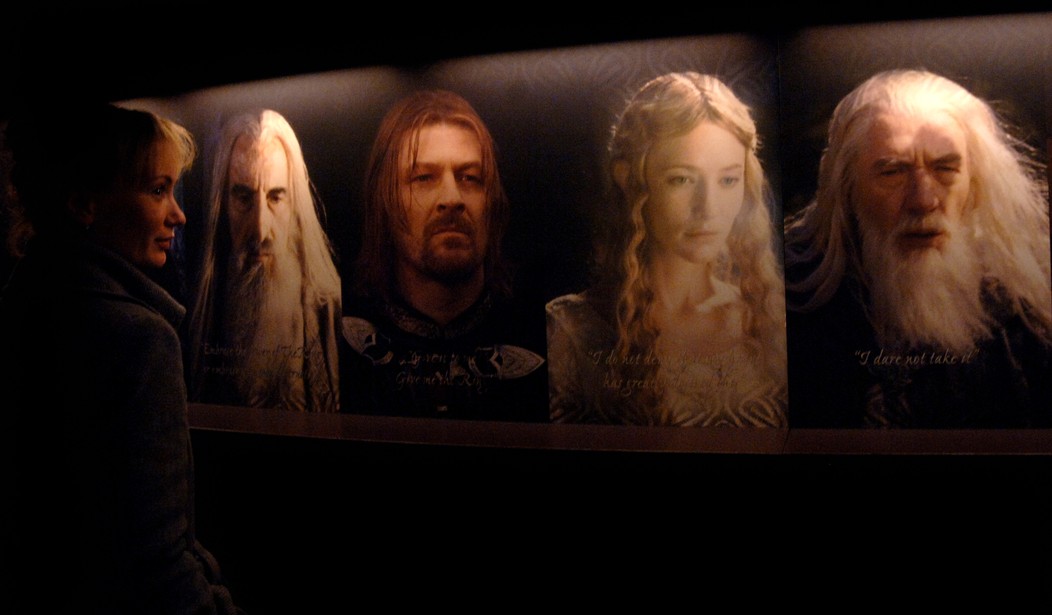Gatekeeping gets a lot of flak and, to be sure, there have been people out there who attempt to use putting others within a subculture down as less because they’re trying to make themselves seem more like true fans. These people exist in every subculture, be they gym rats, firearm enthusiasts, or whiskey drinkers.
You especially see it in political circles…
But gatekeeping, like a gun, is really just a tool that can be used for good for ill and is sometimes very necessary to make sure the spirit of the thing isn’t perverted or corrupted to suit the needs of outside forces.
The reaction by Tolkien fans to Amazon’s new Lord of the Rings series is a perfect example of gatekeeping done right.
J.R.R Tolkien envisioned a world that had certain logics. In other words, characters, cultures, and events followed in a particular way and order that created the world beloved by so many. Amazon has broken this logic in various ways, and I encourage you to watch Nerdtrotic’s video on the subject as he lists various ways Amazon has done this, as well as words from Tolkien himself on the matter of altering his creation.
The logic of any given world is understood best by its fans. When a world as detailed in lore as Tolkien’s is has its logics treated as if they don’t matter, fans are going to let you know and they will not be happy about it.
Things get worse when these fans are either ignored or, as is the case recently, insulted and put down as “trolls” and “fanboys” with all the accusations of isms and phobias attached. Articles get released that effectively make it seem like the people perverting the original works and intentions of the works are the victims. The actual fans are treated as the unreasonable and irrationally angry people in the fringe.
Bold move, Cotton.
The issue is that you’ve effectively ousted the audience that would have formed your work’s foundational support. With the original fandom gone, you’ve got a palace built on sand. It may attract good money at the start but very quickly you’ll notice the returning customers shrink to unsupportable levels. The palace begins to crumble.
You saw this happen with Star Wars, which Disney dealt with its original fan base with such disrespect and abuse that, after some time, people stopped coming to the theaters to see Star Wars movies. Solo did so poorly that it effectively took Star Wars movies off the docket for a while, and the only thing keeping the franchise alive right now are Dave Filoni and Jon Favraeu’s work on Disney+. However, even that’s testing the fandom’s tolerance limit.
Star Wars is in decline and it doesn’t look like it’s going to pull out of the nose dive anytime soon.
But Disney deserves this failure, and as the money continues to decrease, and attention declines, and bad blood rises, one thing should become increasingly clear; despite the fact that Disney has the licensing and intellectual control, the fans of the Star Wars universe still own its soul, and with the owners of its soul pushed out of the picture, the shambling husk will only deteriorate and rot away.
Tolkien has, more or less, gone untouched but as it is one of the staples of western fiction, there was no way it wasn’t going to stay unmolested. All things that the west grew up on have to be “reimagined” (i.e. perverted) for modern times so that modern ideas can be packaged and sold through pre-established and wildly popular IPs.
Amazon learned nothing from the failure of Star Wars and we’re going to see the same thing happen to the Lord of the Rings. This new series that bears the name of Tolkien’s world, characters, etc., has already begun the process of pushing out fans in order to make the franchise into something it’s not. The fans will take the soul of the work with it, and the property will diminish into a husk of its former glory.
Amazon will be punished for its failure to adhere to advice and love of Tolkien fans, the people in whom Tolkien’s vision lives on. They are the gatekeepers to any success, and without them, the property fails. It’s the logic of this world.
At some point, corporations looking to capitalize on popular IPs are going to have to understand that the gatekeeping fans aren’t doing so out of spite, but because they love and cherish the property more than everyone else. They too would love to bring more people into he fandom, but it must be done by staying true to the universe they love, not by altering it and morphing it to fit the times.
Failure to please the gatekeepers results in overall failure of the property, and every subsequent creation will only make it worse.
This is a good thing, though. So long as the gatekeepers hold true to the spirit and soul of the creation, the creation never truly dies and can be brought back in some way in the future by someone who actually respects the source material.
Sometimes, gatekeeping is both right and good.














Join the conversation as a VIP Member